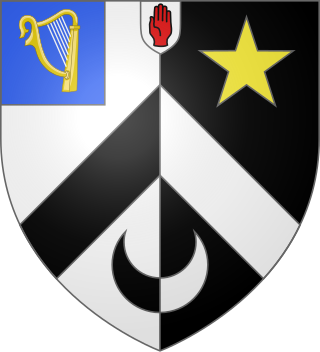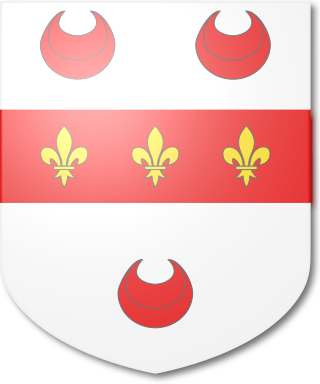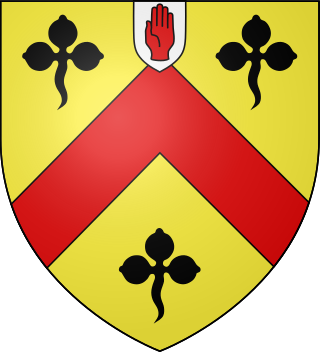The Stronge baronetcy of Tynan was conferred in the Baronetage of the United Kingdom on 22 June 1803. The family were northern Irish landowners of Tynan Abbey, County Armagh, also possessing the residence of Lizard Manor, Aghadowey, County Londonderry.

The Eliott Baronetcy, of Stobs in the County of Roxburgh, is a title in the Baronetage of Nova Scotia. It was created on 3 December 1666 for Gilbert Eliott. The second baronet was a member of the pre-union Parliament of Scotland. The third Baronet sat as Member of Parliament for Roxburghshire. The Eliott Baronets share a common early Elliot ancestry with the nearby Earls of Minto (Elliot). It is thought that the surname spelling differences were contrived to differentiate the branches.
The Adair Baronetcy, of Flixton Hall in the County of Suffolk, was a title in the Baronetage of the United Kingdom. It was created on 2 August 1838 for Robert Adair. He was succeeded by his eldest son, the second Baronet. He sat as Member of Parliament for Cambridge. In 1873 he was created Baron Waveney, of South Elmham in the County of Suffolk, in the Peerage of the United Kingdom. The barony became extinct on his death in 1886 while he was succeeded in the baronetcy by his younger brother, Hugh Adair, the third Baronet. The latter had earlier represented Ipswich in Parliament. Two of his sons, the fourth and fifth Baronets, both succeeded in the title. The fifth Baronet's son, the sixth Baronet, was a major general in the British Army. The title became extinct on the latter's death in 1988.

The Alexander, later Cable-Alexander Baronetcy, of the City of Dublin, is a title in the Baronetage of the United Kingdom. It was created on 11 December 1809 for William Alexander, Lord Mayor of Dublin. The second Baronet was a Director of the Bank of Ireland. The third Baronet was Attorney-General to Albert Edward, Prince of Wales, later Edward VII. The seventh Baronet assumed in 1931 by deed poll the additional surname of Cable. As of 31 December 2013 the present Baronet has not successfully proven his succession and is therefore not on the Official Roll of the Baronetage, with the baronetcy considered dormant.

The Cradock-Hartopp Baronetcy, of Freathby in the County of Leicester and of Four Oaks Hall in the County of Warwick, was a title in the Baronetage of Great Britain. It was created on 12 May 1796 for Edmund Cradock-Hartopp, Member of Parliament for Leicestershire. Born Edmund Bunney, he was the husband of Anne Hurlock, granddaughter and heiress of Sir John Hartopp, 4th Baronet, of Freathby. On his marriage in 1777 he assumed the surname of Cradock-Hartopp in lieu of his patronymic according to the wills of his uncle Joseph Cradock and his wife's grandfather. His eldest surviving son Edmund, the second Baronet, died childless and was succeeded by his younger brother, William, the third Baronet. The title then descended from father to son until the death of his grandson, Charles, the fifth Baronet, in 1929.

The Edge Baronetcy, of Ribble Lodge in Lytham St Annes in the County Palatine of Lancaster, is a title in the Baronetage of the United Kingdom. It was created on 9 June 1937, for the Liberal politician Sir William Edge. He represented Bolton and Bosworth in the House of Commons.

The Brooksbank Baronetcy, of Healaugh Manor, in the parish of Healaugh, in the West Riding of the County of York, is a title in the Baronetage of the United Kingdom. It was created on 15 September 1919 for Edward Brooksbank. He was a Justice of the Peace and a Deputy Lieutenant for the West Riding of Yorkshire. He was succeeded by his grandson, the second Baronet. He was a Colonel in the Yorkshire Yeomanry and also served as a justice of the peace and as a Deputy Lieutenant of the East Riding of Yorkshire. Currently, the title is held by his son, the third Baronet, who succeeded in 1983.

The Hogg, later Lindsay-Hogg Baronetcy, of Rotherfield Hall in Rotherfield in the County of Sussex, is a title in the Baronetage of the United Kingdom. It was created on 22 December 1905 for Lindsay Hogg, Conservative Member of Parliament for Eastbourne from 1900 to 1906. He assumed by Royal licence the additional surname of Lindsay before that of Hogg in 1906.

The Wiggin Baronetcy, of Metchley Grange in Harborne in the County of Stafford and of Garth Gwynion in Machynlleth in the County of Montgomery, is a title in the Baronetage of the United Kingdom. It was created on 17 June 1892 for Henry Wiggin. He was the founder of Henry Wiggin and Co Ltd, manufacturers of specialty metal products, and also represented Staffordshire East and Handsworth in the House of Commons. The second Baronet was High Sheriff of Staffordshire in 1896. The third Baronet was a colonel in the army and served as High Sheriff of Warwickshire in 1942. The fourth Baronet was high sheriff of Warwickshire from 1975 to 1976 and a deputy lieutenant of the county in 1985.

The Macgregor Baronetcy, of Savile Row in the County of Middlesex, is a title in the Baronetage of the United Kingdom. It was created on 17 March 1828 for Patrick Macgregor, Serjeant-Surgeon to King George IV. Charles Reginald Macgregor (1847–1902), second son of the third Baronet, was a Brigadier-General in the Army.

The Oakeley Baronetcy, of Shrewsbury, is a title in the Baronetage of Great Britain. It was created on 5 June 1790 for the Indian administrator Charles Oakeley. He served as Governor of Madras from 1790 to 1794. Frederick Oakeley was the second son of the first Baronet.

The Welby Baronetcy, of Denton Manor in the County of Lincoln, is a title in the Baronetage of the United Kingdom.

The Levinge Baronetcy, of High Park in the County of Westmeath, is a title in the Baronetage of Ireland. It was created on 26 October 1704 for Richard Levinge, Speaker of the Irish House of Commons and Lord Chief Justice of the Irish Court of Common Pleas. The seventh Baronet sat as Liberal Member of Parliament for Westmeath from 1857 to 1865.

The Elton Baronetcy, of Bristol, is a title in the Baronetage of Great Britain. It was created on 31 October 1717 for Abraham Elton, Mayor of and Member of Parliament for Bristol from 1722 to 1727. The second Baronet was also Mayor of Bristol and represented Taunton and Bristol (1727–1742) in the House of Commons. The seventh Baronet sat as Liberal Member of Parliament for Bath. The eighth Baronet was High Sheriff of Somerset in 1895. The tenth Baronet was a pioneer of the British documentary film industry.

The Buckworth, later Buckworth-Herne, later Buckworth-Herne-Soame Baronetcy, of Sheen in the County of Surrey, is a title in the Baronetage of England. It was created on 1 April 1697 for John Buckworth, High Sheriff of London in 1704. The second Baronet sat as Member of Parliament for Weobley. The third Baronet was Assistant Gentleman Usher to George II. The fifth Baronet was Gentleman-Pensioner and Exon of the Guard during the reign of George III. He married Anne, daughter of Paston Herne, of Haveringland Hall, Norfolk, and assumed by Royal licence the additional surname of Herne. The sixth Baronet assumed in 1806 by Royal licence the additional surname of Soame in compliance with the will of Sir Peter Soame, 4th Baronet, of Thurlow. The ninth Baronet was a member of the Shropshire County Council.
Sir Edward Sullivan, 1st Baronet, PC (Ire) was an Irish lawyer, and a Liberal Member of Parliament for Mallow, 1865–1870 in the House of Commons of the United Kingdom of Great Britain and Ireland. He was also Solicitor General for Ireland, 1865–1866, Attorney General for Ireland, 1868, Master of the Rolls in Ireland, 1870. Created a baronet, 29 December 1881, from 1883 to 1885 he was Lord Chancellor of Ireland.

The Abdy Baronetcy, of Albyns, in the County of Essex, was created in the Baronetage of the United Kingdom on 22 December 1849 for Thomas Neville Abdy who sat for Lyme Regis in the British House of Commons. It was a second creation for the seat: see Abdy baronets of Albyns (1660).
The Vavasour Baronetcy, of Hazlewood in the County of York, was created in the Baronetage of the United Kingdom on 14 February 1828 for Edward Vavasour. He was the third son of Charles Stourton, 17th Baron Stourton, and the maternal cousin of the seventh and last Vavasour Baronet of the 1628 creation. He succeeded to the Vavasour estates and assumed by Royal licence the surname of Vavasour.
The Sullivan baronetcy, of Thames Ditton in the County of Surrey, was created in the Baronetage of the United Kingdom on 22 May 1804 for the writer and MP Richard Sullivan. The third and sixth Baronets were Admirals in the Royal Navy. The ninth holder of the baronetcy did not use his title; as of 2023 the Official Roll marked the baronetcy as vacant.
The Maxwell baronetcy of Monreith was created in the Baronetage of Nova Scotia on 8 January 1681 for William Maxwell of Monreith House in Mochrum, Wigtownshire.














